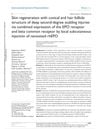 13 citations,
October 2017 in “Bioscience, Biotechnology, and Biochemistry”
13 citations,
October 2017 in “Bioscience, Biotechnology, and Biochemistry” Centella asiatica extract may help promote hair growth by blocking a specific cell signaling pathway.
 December 2021 in “Medicina estética”
December 2021 in “Medicina estética” Serenoa repens may help treat hair loss but is less effective than common medications and needs more research to confirm its effectiveness.
3 citations,
January 2023 in “Nutrients” Hordenine may help hair grow by activating a specific cell growth pathway.
 4 citations,
March 2014 in “The FASEB Journal”
4 citations,
March 2014 in “The FASEB Journal” The HIF-2α/ARNT complex is important for hair follicle development by controlling cell growth.
 August 1994 in “Journal of dermatological science”
August 1994 in “Journal of dermatological science” Different substances affect hair and skin cell growth in various ways.
 23 citations,
July 1996 in “Archives of Dermatological Research”
23 citations,
July 1996 in “Archives of Dermatological Research” bFGF, VEGF, and minoxidil decrease collagen production in hair cells, possibly affecting hair growth.
 July 2024 in “Biological and Pharmaceutical Bulletin”
July 2024 in “Biological and Pharmaceutical Bulletin” Licorice extract helps hair growth and may treat hair loss.
5 citations,
February 2021 in “Gels” HYDRO DELUXE BIO hyaluronic acid hydrogel is compatible with skin cells, may reduce inflammation, promote blood vessel growth, and protect against oxidative stress, suggesting it could help revitalize hair follicles.
 January 2024 in “Frontiers in Bioengineering and Biotechnology”
January 2024 in “Frontiers in Bioengineering and Biotechnology” A new method using stem cell membranes to deliver Minoxidil improved hair growth in mice better than Minoxidil alone.
 15 citations,
March 2012 in “International journal of nanomedicine”
15 citations,
March 2012 in “International journal of nanomedicine” Local injections of nanosized rhEPO can speed up skin healing and improve quality after deep second-degree burns.
September 2023 in “Animals” Hair follicle development in cashmere goats involves dynamic changes in proteins and metabolites, with key roles for oxytocin, MAPK, and Ca2+ pathways.
 January 2024 in “ACS Biomaterials Science & Engineering”
January 2024 in “ACS Biomaterials Science & Engineering” A new method using a microfluidic device can prepare hair follicle germs efficiently for potential use in hair loss treatments.
 7 citations,
January 2020 in “Scientific Reports”
7 citations,
January 2020 in “Scientific Reports” Rabbit skin analysis showed changes in hair growth and identified miRNAs that may regulate hair follicle development.
February 2024 in “Cosmetics” The conclusion is that new plant-based treatments for hair loss may work by targeting certain enzymes.
 829 citations,
May 2007 in “Nature”
829 citations,
May 2007 in “Nature” Hair follicles can regrow in wounded adult mouse skin using a process like embryo development.
52 citations,
February 2012 in “PloS one” Lack of Ctip2 in skin cells delays wound healing and disrupts hair follicle stem cell markers in mice.
January 2025 in “Molecules” Caffeine may help with hair loss, but more research is needed to confirm its effectiveness.
 11 citations,
April 2019 in “Journal of Biological Research”
11 citations,
April 2019 in “Journal of Biological Research” The study identified 12 potential biomarkers for hair loss and how they affect hair growth.
December 2023 in “Animals” The research found genes and miRNAs that may control hair growth in Forest Musk Deer.
 86 citations,
October 2005 in “Experimental Dermatology”
86 citations,
October 2005 in “Experimental Dermatology” The Foxn1 gene mutation causes hairlessness and immune system issues, and understanding it could lead to hair growth disorder treatments.
 8 citations,
July 2017 in “Biochemical and biophysical research communications”
8 citations,
July 2017 in “Biochemical and biophysical research communications” A new compound, BOI, can help hair grow by changing hair cycle phases and increasing certain cell contents.
 16 citations,
December 2019 in “Animals”
16 citations,
December 2019 in “Animals” Overexpressing Tβ4 in goats' hair follicles increases cashmere production and hair follicle growth.
 14 citations,
February 2021 in “Journal of the European Academy of Dermatology and Venereology”
14 citations,
February 2021 in “Journal of the European Academy of Dermatology and Venereology” A COVID-19 patient with severe hair loss did not improve with hair loss medication after stopping and restarting it due to the infection.
 67 citations,
May 2014 in “International Journal of Molecular Sciences”
67 citations,
May 2014 in “International Journal of Molecular Sciences” Using your own skin cells can help repair aging skin and promote hair growth.
 18 citations,
February 2018 in “International Journal of Molecular Sciences”
18 citations,
February 2018 in “International Journal of Molecular Sciences” PGD2 increases androgen receptor activity in hair cells, which could be targeted to treat hair loss.
 3 citations,
June 2023 in “The journal of investigative dermatology/Journal of investigative dermatology”
3 citations,
June 2023 in “The journal of investigative dermatology/Journal of investigative dermatology” The conclusion suggests that focusing on certain cellular pathways may improve the prevention and repair of hair loss caused by radiotherapy.
 36 citations,
May 2016 in “Biomaterials”
36 citations,
May 2016 in “Biomaterials” Endo-HSE helps grow hair-like structures from human skin cells in the lab.
 17 citations,
October 2015 in “Medicine and Pharmacy Reports”
17 citations,
October 2015 in “Medicine and Pharmacy Reports” Animal models are crucial for learning about hair loss and finding treatments.
 32 citations,
May 2018 in “Cell Cycle”
32 citations,
May 2018 in “Cell Cycle” Melatonin helps Cashmere goats grow more hair by affecting certain genes and cell pathways.
 1 citations,
January 2016 in “Elsevier eBooks”
1 citations,
January 2016 in “Elsevier eBooks” The document concludes that identifying the specific cells where skin cancers begin is important for creating better prevention, detection, and treatment methods.






















